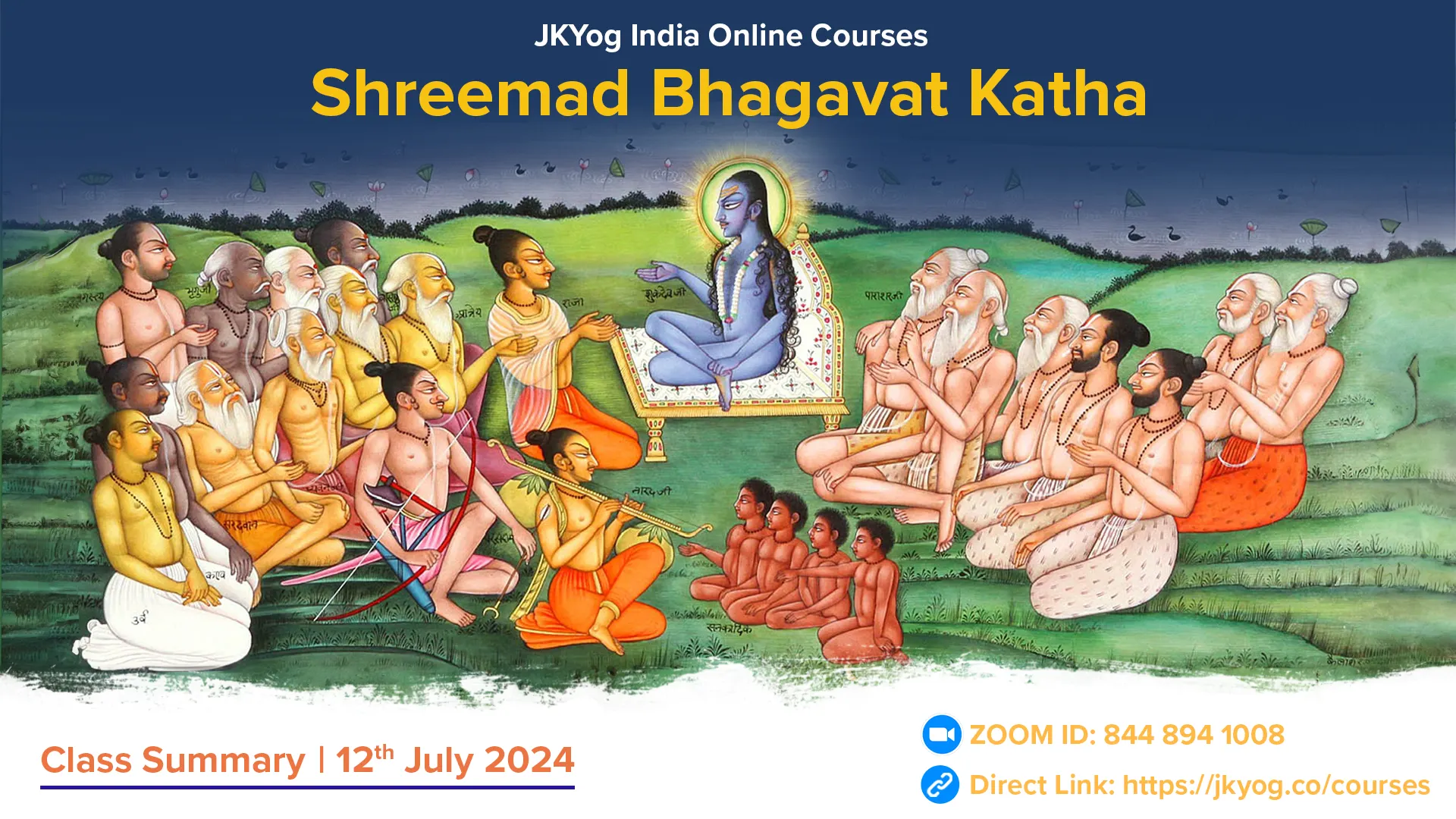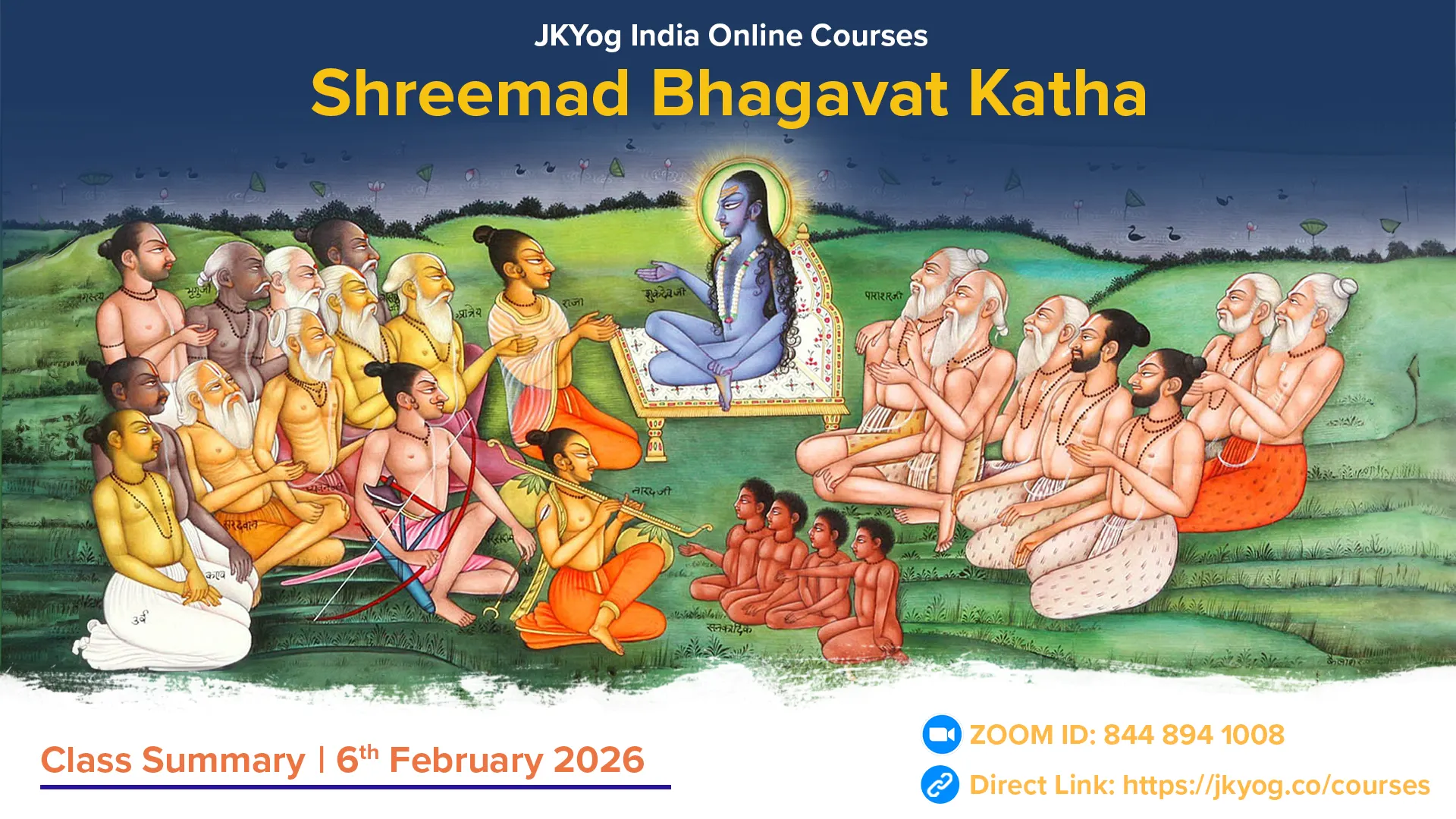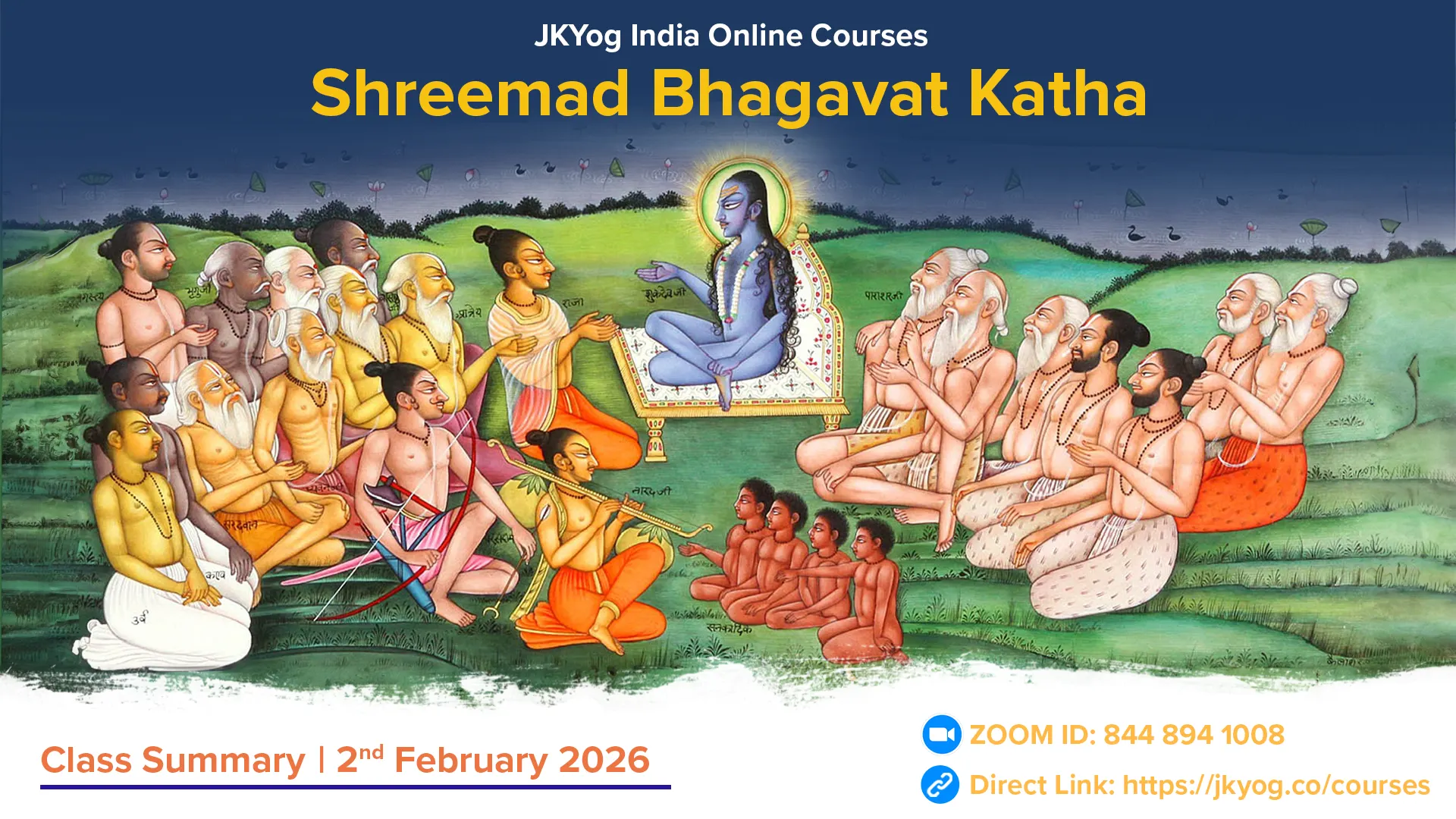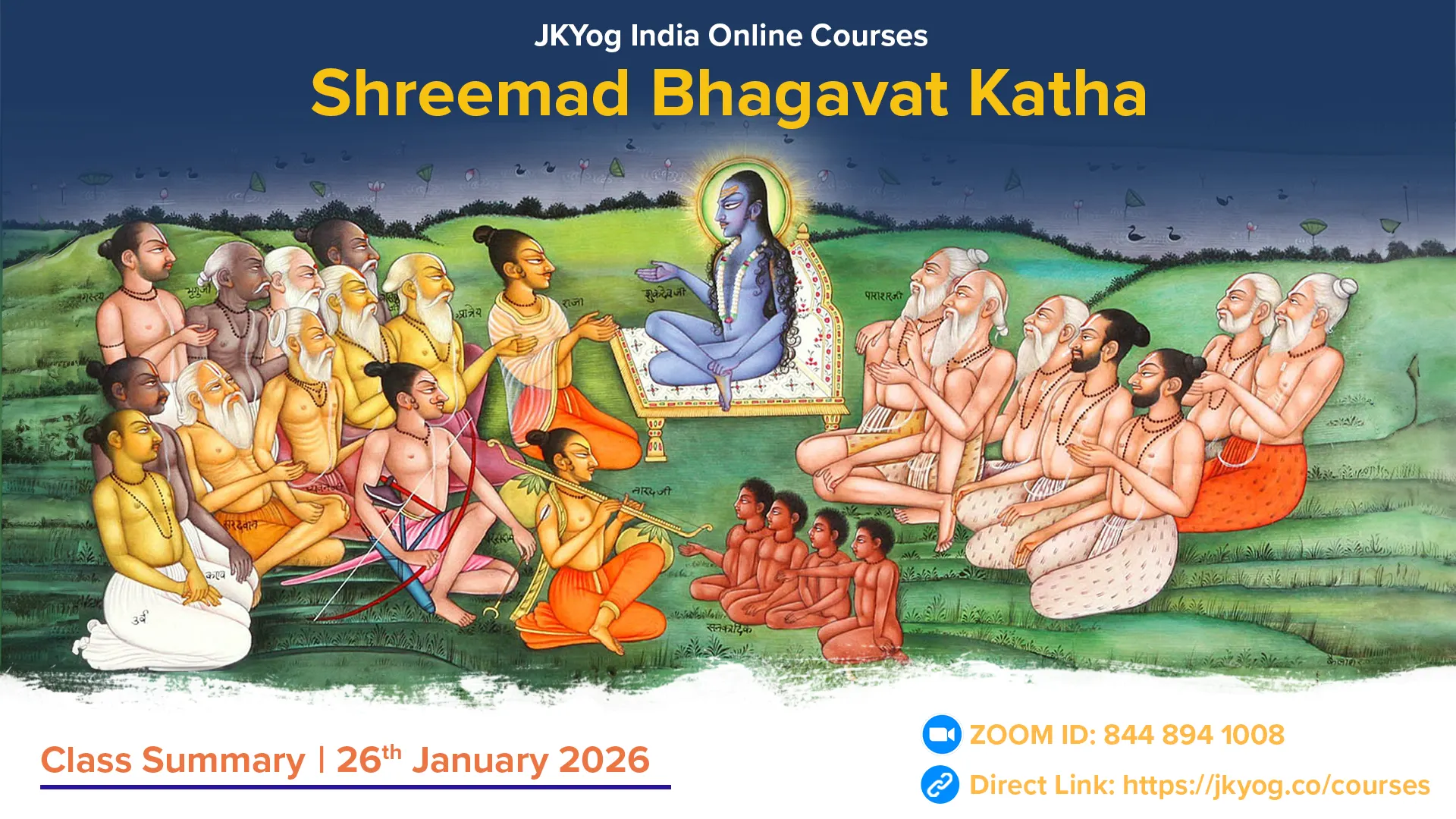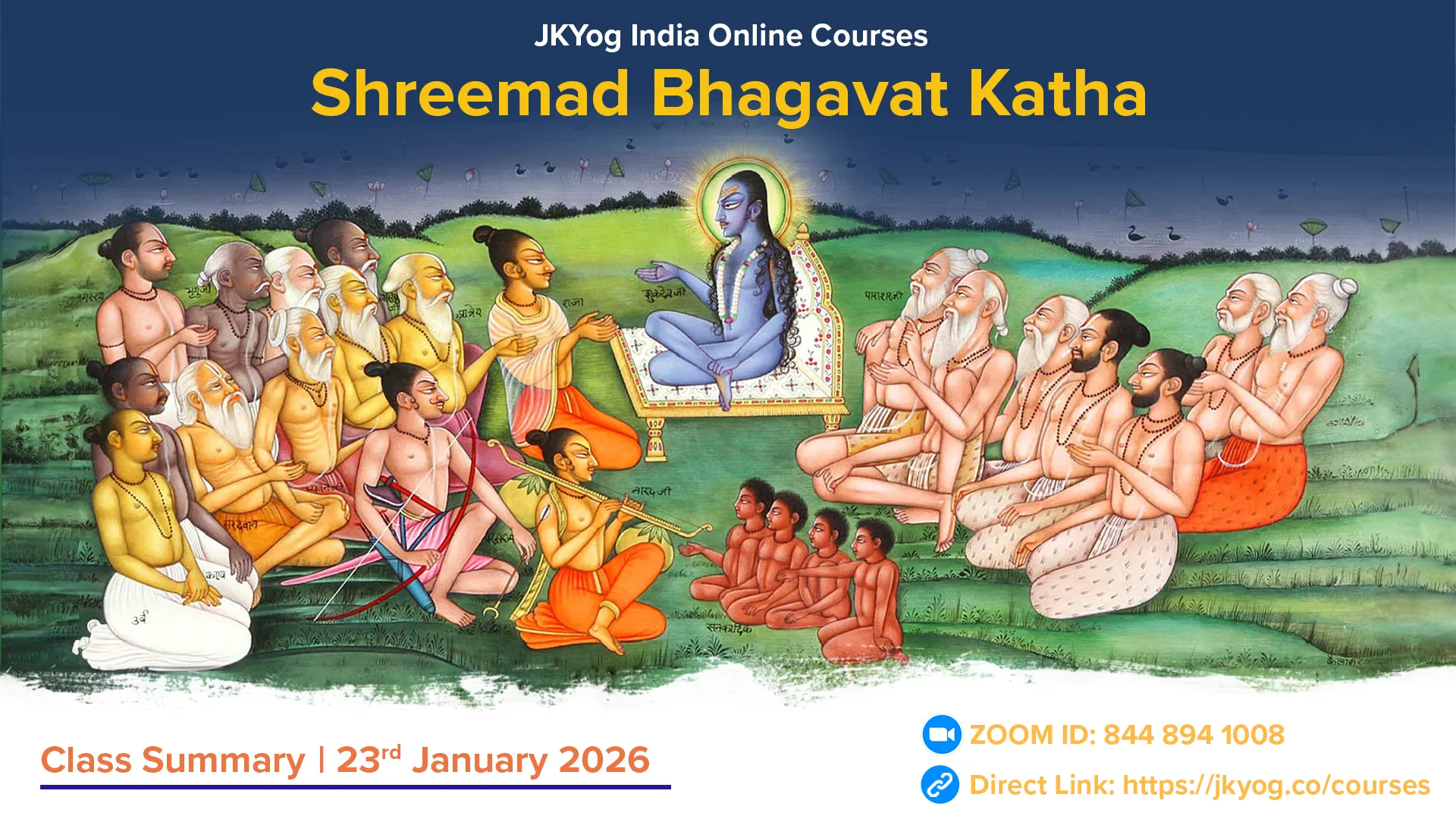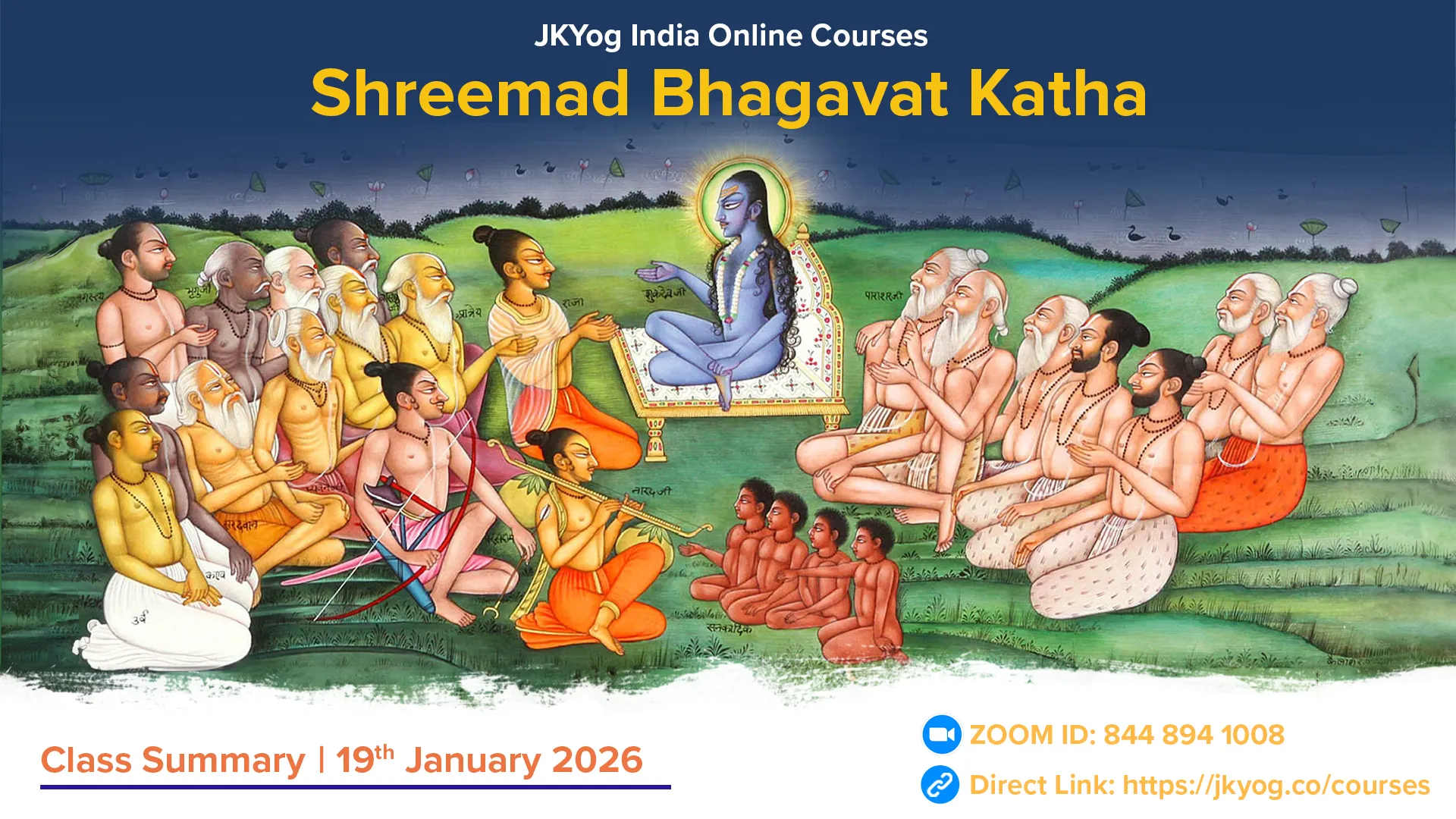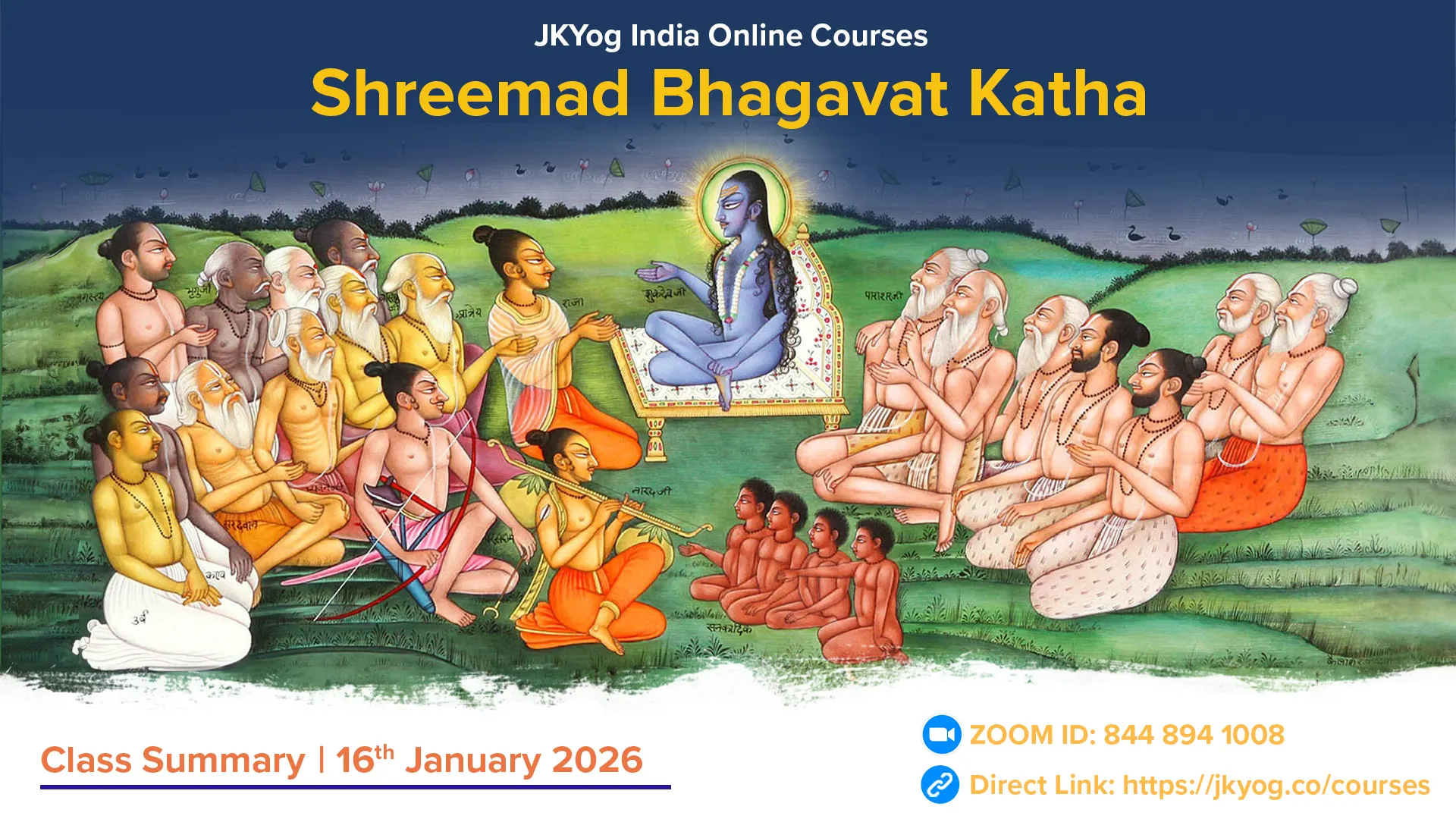Shreemad Bhagavat Mahapuran- Canto: 1, Chapters: 10 to 12
Shaunakji asks Sutji about Yudhishthir's reign after the battle of Mahabharat. Sutji explains that Shree Krishna reestablishes the Kuru dynasty, bringing peace to Yudhishthir's mind through His and Bhishma Pitamah's teachings. Yudhishthir expands his kingdom to the sea, with his brothers obedient to him.
Shree Krishna stays in Hastinapur for a few months. When He asks for permission to return to Dwarka, Yudhishthir embraces Him and grants His request. Bhagawan bows to Yudhishthir and boards His chariot. Some contemporaries embrace Him, while the younger ones bow down. Subhadra, Draupadi, Kunti, Uttara, Gandhari, Dhritarashtra, Yuyutsu, Kripacharya, Nakul, Sahadev, Bhimasen, and Dhoumya, unable to bear the separation from Shree Krishna.
As Shree Krishna leaves, the eyes of the ladies of the family fill with tears, but they hold them back, fearing ominous signs during His journey. During His departure, musical instruments like Mridang, Shankh, Bheri, Veena, Dhol, Narasingha, Dhundhuri, Nagara, Ghanta, and Dundubhi played. The women of the Kuru clan, eager to see Him, climb terraces and shower flowers upon Him. Arjun holds a white umbrella over Him while Uddhav and Satyaki wave fans. Flowers are showered from all sides, and the Brahmins' blessings resound.
The noble ladies of Hastinapur, their minds deeply absorbed in Shree Krishna, converse among themselves: "Friends, this Shree Krishna is the Supreme Brahman Himself. Complete purification of the inner being is achieved only through devotion to Him, not merely through practices like Yoga. He is the one with beautiful pastimes sung by mystic sages like Vyas in the Vedas and other sacred scriptures. As the Supreme God, He creates, sustains, and destroys the world through His divine pastimes yet remains unattached to them. When kings with Tamasic intellects rule unrighteously, He incarnates for the world's welfare in various ages."
They continue, "The Yadu dynasty is most praiseworthy because Shree Krishna has honoured it by taking birth within it. The sacred Madhuvan (Vraj Mandal) is blessed and beautified by His presence during infancy and adolescence. It is a great joy that Dwarka has enhanced the sacred fame of the earth, surpassing even the glory of heaven."
"The women He has married must have worshipped this Supreme Being through fasting, bathing, and performing havans. His sons, such as Pradyumna, Samba, and Amb, the eight chief queens like Rukmini, and the thousands of other wives are truly blessed."
While the women of Hastinapur converse, Shree Krishna looks at them, smiles, and then boards His chariot to leave. Yudhishthir sends elephants, horses, chariots, and infantry to protect Shree Krishna out of affection and concern for potential attacks. The Pandavas, filled with love, accompany Him a long distance, growing restless at the thought of future separation. Shree Krishna insists on bidding them farewell and continues His journey to Dwarka with His loving friends Satyaki and Uddhav.
After reaching Dwarka, Shree Krishna blows His Panchjanya conch. Hearing it, all the people come forward to see Him. Shree Krishna, being Atmaram, is always satisfied within Himself. Yet, the people welcome Him with great respect and numerous gifts, much like offering lamps to Lord Surya.
Everyone's face blossoms with love. They praise their friend and protector, Shree Krishna, with joyful voices akin to children speaking to their father: "Swami! We always bow to Your feet, worshipped by Brahma, Shankar, and Indra. You are our mother, friend, master, and father; our true Guru and supreme God. We are fulfilled by serving Your feet. May You bless us, for we are caretakers after finding You."
Hearing these words and showering His blessings with a kind glance, Shree Krishna enters Dwarka. As serpents protect their city, Bhogavati (Patalpuri), the Vrishnivanshi Yadavas protect Dwarkapuri. The city is resplendent with all seasons' splendour, adorned with sacred trees, creepers, fruit gardens, flower gardens, and playgrounds. Lotus-filled ponds further enhance its beauty. The city gates, palace doors, and roads are adorned with festoons to welcome Shree Krishna. Flags and banners flutter everywhere, providing shade and relief from the heat. The highways, streets, markets, and squares are swept clean and sprinkled with fragrant water. Fruits, flowers, unbroken rice, and sprouts are scattered to honour the Lord. Curd, unbroken rice, fruits, sugarcane, pots filled with water, gifts, and incense sticks are placed at every house door.
Upon hearing of Shree Krishna's arrival, Vasudev, Akrur, Ugrasen, Balaram, Pradyumna, Samba, and others abandon their essential activities in joyous excitement. Conches and trumpets play, and Vedic chants fill the air. They board chariots, eager to welcome the Shree Krishna. Hundreds of women, anxious to see Shree Krishna, dress up, sit in palanquins, and head out to greet Him.
Shree Krishna meets His relatives and citizens individually, respecting each other according to their status. He bows to some, greets others with words, embraces some, shakes hands, smiles at some, and looks lovingly at others. He grants boons according to their wishes. Having satisfied everyone, Shree Krishna enters the city with all, taking blessings from the Gurus, Brahmins, elders, and others while listening to salutations from the courtiers.
Sutji tells Shaunakji that as Shree Krishna travels on the highway, the women of Dwarka climb to their terraces, seeing His sight as bliss. Bhagwan's mouth is a vessel filled with the nectar of beauty to be drunk by the eyes. His arms give strength to even the world's protectors. His lotus feet shelter the devotee. Every part of His body is the abode of beauty. The residents of Dwarka gaze upon this divine image of the Bhagwan daily, yet their eyes are never satisfied.
First, Shree Krishna visits His parents' palace, where He joyfully bows at the feet of His seven mothers, including Devaki. The mothers embrace Him warmly.
After getting permission from His mother, He proceeds to His palace, where separate residences for His sixteen thousand wives await. The queens are overjoyed to see their beloved Shree Krishna returning home after being away for a long time.
Sutji says that the queen's eyes welled up with tears of love at that moment. They tried to hold back their tears out of hesitation, but the tears flowed helplessly.
The Birth of King Parikshit
Shaunakji says, "The extremely powerful Brahmastra destroyed Uttara's womb, which Ashwatthama fired, but God revived her. Please tell us about the birth, karma, death, and the state attained after that of the great, knowledgeable King Parikshit, who was born from that womb and to whom Shukdevji imparted knowledge. We want to hear it with great devotion."
Sutji responds, "When Parikshit, in Uttara's womb, starts burning with the power of Ashwatthama's Brahmastra, he sees a luminous figure before his eyes. This figure is the size of a thumb but possesses a pure appearance. He has a beautiful dark body, wears yellow clothes shining like lightning, and a golden crown glitters on His head. He has four long, beautiful arms, with gold earrings adorning His ears. His eyes are red, and He is rotating a mace in His hand, protecting the child by revolving around him. Seeing this divine figure, the child in the womb wonders who He is.
Thus, in front of the ten-month-old child in the womb, the protector of Dharma, Shree Krishna, pacifies the Brahmastra's intensity and then disappears.
Parikshit, the descendant of Pandu, is born at an auspicious time. King Yudhishthir is overjoyed at the news of his grandson's birth. He arranges for the Brahmins, including Dhoumya and Kripacharya, to perform the Mangalvachan and Jaatkaram Sanskar. Even before the child's umbilical cord is cut, Yudhishthir donates gold, cows, land, villages, elephants, horses of the best breed, and the finest food to the Brahmins. They tell Yudhishthir that this child will be very famous, a great devotee of God, and a great man.
Yudhishthir asks, "O great men! Will this child follow in the footsteps of our dynasty's pious and great kings?"
The Brahmins respond, "Dharmaraj! This son of Abhimanyu will take care of his subjects like King Ikshwaku and be truthful like Shree Ram, the son of Dasharath. He will be a donor like Sibi, love those who seek refuge, and spread the fame of his lineage like Dushyant's son Bharat. He will be foremost among archers like Sahasrabahu Arjun and his grandfather Partha. He will be as fierce as fire and as challenging to cross as the ocean.
He will be as valiant as a lion, as sheltering as the Himalayas, as patient as the earth, and as tolerant as parents. He will have the equality of Brahma and the kindness of Bhagwan Shankar, and in giving shelter to all living beings, he will be like Bhagwan Vishnu. He will follow Shree Krishna in embracing all virtues, being generous like Rantidev and religious like Yayati. He will have Bali's patience and Prahlad's firm devotion towards Shree Krishna. He will perform many Ashwamedha Yajnas and serve older people.
His sons will be Rajarshis. He will punish those who violate the code of conduct and suppress Kaliyug to protect Mother Earth and Dharma. Hearing about his death by Takshak due to the curse of a Brahmin boy, he will give up attachment to everything and take refuge in the feet of God. He will gain knowledge of the soul's true nature from Shukdevji and, finally, by giving up his body on the banks of the Ganga, will attain shelter in God's divine abode." The Brahmins, experts in astrology, tell King Yudhishthir the result of the child's birth chart, receive gifts and prayers, and then go to their respective homes.
This child became famous around the world as Parikshit. The name "Parikshit" is derived from the Sanskrit word "Pariksha," which means "examination." It signifies "the one who examines" or "the examiner." This name is given to the child because he constantly examines and searches for the divine figure he saw while in the womb.
Prince Parikshit grows up quickly, developing day by day under the care of his teachers. At this time, to atone for the killings of his relatives, King Yudhishthir thinks of worshipping God by performing the Ashwamedha Yajna. However, he becomes distraught as he has no money besides the taxes and penalty amounts collected from the subjects. Understanding his concern, his brothers, inspired by Shree Krishna, brought a lot of wealth left by King Marut and the Brahmins in the north. Yudhishthir collects the materials for the Yajna from that wealth and worships God by performing three Ashwamedha Yajnas.
Shree Krishna, who comes to Hastinapur on Yudhishthir's invitation, gets the Yajna performed by the Brahmins and stays there for several months to please the Pandavas.
After this, Shree Krishna leaves for Dwarka, taking Arjun with Him.
Summary: JKYog India Online Class- Shreemad Bhagavat Katha [Hindi]- 12.07.2024

